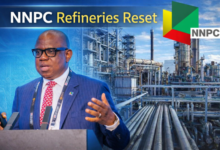Nigeria First in Action: BPP-NASENI Pact to Drive Local Innovation, Manufacturing, and Economic Expansion

In a bold move to deepen local content, spur industrialisation, and institutionalise the “Nigeria First Policy,” the Bureau of Public Procurement (BPP) and the National Agency for Science and Engineering Infrastructure (NASENI) have signed a game-changing Memorandum of Understanding (MoU) aimed at structurally aligning indigenous innovation with public procurement pipelines.
The MoU, signed on Monday in Abuja, lays the groundwork for systematic inclusion of locally manufactured goods, technologies, and engineering solutions into public sector procurement, effectively placing Nigerian-made innovation at the heart of national development.
A New Era of Policy-Aligned Procurement
Speaking during the ceremony, Dr. Adebowale Adedokun, Director-General of the BPP, framed the agreement as more than an MoU—“a national commitment to bridge production with procurement”.
“We are not just signing a document. We are building a new economic supply chain—one that favours Nigerian innovation and makes our homegrown solutions the default procurement choice across MDAs,” Adedokun said.
Under the agreement, products engineered by NASENI—including tractors, tablets, solar energy kits, surveillance drones, and industrial tools—will now enjoy priority listing across the procurement channels of Ministries, Departments, and Agencies (MDAs). This is expected to deepen industrial linkages, preserve forex, and fast-track technology transfer, job creation, and SME growth.
Nigeria First Policy Gets Structural Backbone
The Nigeria First Policy, a federal initiative aimed at curbing overdependence on imported goods, gains a major boost through this pact.
To ensure transparency and traceability, NASENI’s product catalogues will be fully integrated into the Nigeria Open Contracting Portal (NOCOPO), enabling real-time visibility for MDAs, vendors, and citizens.
In the first half of 2025 alone, the NOCOPO platform, driven by enhanced price intelligence, saved the country ₦173 billion (approx. $155 million) in procurement efficiency. These savings are now poised to be reinvested into infrastructure, education, healthcare, and SME support.
Beyond Protectionism—Patriotism Through Performance
Adedokun stressed that the initiative was not protectionist but patriotic, highlighting that NASENI’s product standards have been validated by the Standards Organisation of Nigeria (SON) and NAFDAC.
“This isn’t about shielding mediocrity—it’s about rewarding excellence. When Nigeria produces quality, Nigeria must buy Nigerian,” he noted.
To support implementation, both agencies have established a Technical Working Committee to synchronise production timelines with procurement cycles, ensure policy compliance, and eliminate friction in value-chain execution.
NASENI’s Bold Bet on Innovation and Manufacturing
Khalil Halilu, Executive Vice-Chairman/CEO of NASENI, said the agreement would accelerate Nigeria’s industrial renaissance by giving priority procurement status to companies aligned with NASENI’s tech ecosystem.
“This MoU strengthens our value proposition. It gives our local partners a guaranteed route to market and shows investors that innovation in Nigeria now comes with institutional support.”
In the past 18 months, NASENI has received over 900 partnership requests from local and international firms. So far, 50 market-ready products have been developed, including in electronics, green energy, drones, and EVs.
The agency is also investing in large-scale industrial infrastructure, including:
- A Renewable Energy Park in Keffi
- Development facilities in Abuja Industrial Park and Abuja Technology Village
- A high-tech showroom along the Kubwa Expressway, scheduled for public unveiling
Halilu added that NASENI’s workforce is gender-inclusive and youth-driven, reinforcing the agency’s role in both industrial and social transformation.
BRANDECONOMY Insight: Procurement-Led Industrial Policy Could Be a Game-Changer
Policy analysts see the BPP-NASENI MoU as a potential model for “procurement-led industrial policy,” where government purchasing power is used as a tool to stimulate local production, deepen supply chains, and improve economic resilience.
If successfully implemented and adopted across other government-facing innovation agencies, it could reposition Nigeria as a regional hub for industrial engineering and tech manufacturing.
Conclusion: From MoU to Market Impact
With this strategic alignment, the Federal Government has sent a strong message: local production is no longer a patriotic slogan—it is a procurement imperative. The true test, however, will be execution, enforcement, and uptake by MDAs.
The BPP and NASENI pact is not just a policy footnote; it is a signal that Nigeria may finally be building the scaffolding for sustainable industrial takeoff—one public contract at a time.












